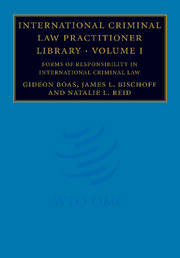Book contents
- Frontmatter
- Contents
- Foreword
- Table of authorities
- 1 Introduction
- 2 Joint criminal enterprise
- 3 Superior responsibility
- 4 Complicity and aiding and abetting
- 5 Planning, instigating and ordering
- 6 Concurrent convictions and sentencing
- 7 Conclusion
- Annex: Elements of forms of responsibility in international criminal law
- Index
5 - Planning, instigating and ordering
Published online by Cambridge University Press: 08 January 2010
- Frontmatter
- Contents
- Foreword
- Table of authorities
- 1 Introduction
- 2 Joint criminal enterprise
- 3 Superior responsibility
- 4 Complicity and aiding and abetting
- 5 Planning, instigating and ordering
- 6 Concurrent convictions and sentencing
- 7 Conclusion
- Annex: Elements of forms of responsibility in international criminal law
- Index
Summary
Article 7(1) of the ICTR Statute and Article 6(1) of the ICTR Statute (‘Article 7/6(1)’) provide for the imposition of liability on persons who plan, instigate, or order crimes within the jurisdiction of the Tribunals in the following terms:
A person who planned, instigated, ordered, committed or otherwise aided and abetted in the planning, preparation or execution of a crime referred to in … the present Statute, shall be individually responsible for the crime.
Planning, instigating and ordering, as defined in the jurisprudence of the ad hoc Tribunals, have very similar elements; indeed, their respective mental elements are identical. Unlike joint criminal enterprise (JCE), superior responsibility, complicity in genocide, or even aiding and abetting, these forms of responsibility do not appear to have presented major interpretational or definitional difficulties to the chambers of the ad hoc Tribunals, and their elements have undergone relatively little alteration since they were solidified in the Akayesu and Blaškić Trial Judgements.
This chapter begins by discussing the evolution of the elements of planning, instigating and ordering from this early jurisprudence to the most recent judgements, with particular focus on the ICTY Appeals Chamber's affirmation that these forms of responsibility have two alternative mental elements: ‘direct intent’, or that the accused intended that the crime planned, instigated, or ordered be committed; and ‘indirect intent’, or that the accused was aware of the substantial likelihood that a crime would be committed as a consequence of his conduct.
- Type
- Chapter
- Information
- International Criminal Law Practitioner Library , pp. 343 - 380Publisher: Cambridge University PressPrint publication year: 2008



